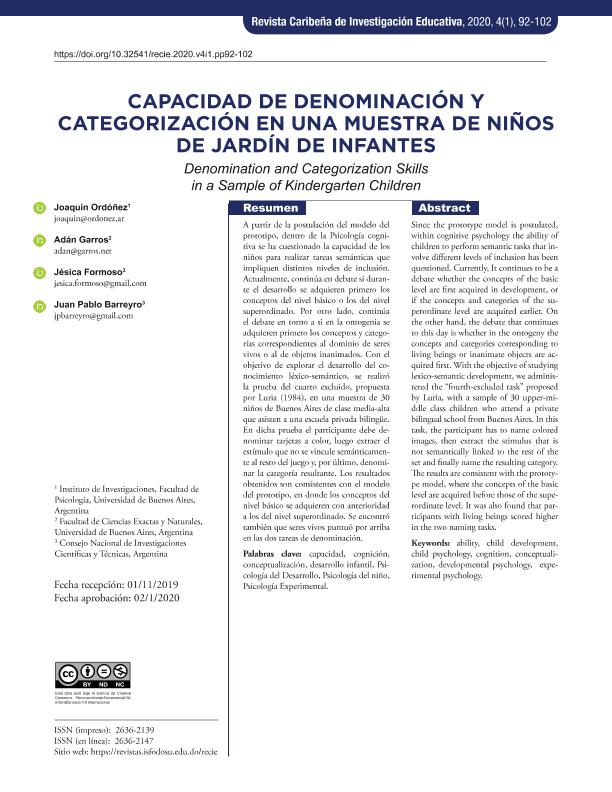Mostrar el registro sencillo del ítem
dc.contributor.author
Ordoñez, Joaquín
dc.contributor.author
Garros, Adan
dc.contributor.author
Formoso, Jesica

dc.contributor.author
Barreyro, Juan Pablo

dc.date.available
2022-09-14T13:32:43Z
dc.date.issued
2020-03
dc.identifier.citation
Ordoñez, Joaquín; Garros, Adan; Formoso, Jesica; Barreyro, Juan Pablo; Capacidad de denominación y categorización en una muestra de niños de Jardín de Infantes; Instituto Superior de Formación Docente Salomé Ureña; Revista Caribeña de Investigación Educativa; 4; 1; 3-2020; 92-102
dc.identifier.issn
2636-2139
dc.identifier.uri
http://hdl.handle.net/11336/168661
dc.description.abstract
A partir de la postulación del modelo del prototipo, dentro de la Psicología cognitiva se ha cuestionado la capacidad de los niños para realizar tareas semánticas que impliquen distintos niveles de inclusión. Actualmente, continúa en debate si durante el desarrollo se adquieren primero los conceptos del nivel básico o los del nivel superordinado. Por otro lado, continúa el debate en torno a si en la ontogenia se adquieren primero los conceptos y categorías correspondientes al dominio de seres vivos o al de objetos inanimados. Con el objetivo de explorar el desarrollo del conocimiento léxico-semántico, se realizó la prueba del cuarto excluido, propuesta por Luria (1984), en una muestra de 30 niños de Buenos Aires de clase media-alta que asisten a una escuela privada bilingüe. En dicha prueba el participante debe denominar tarjetas a color, luego extraer el estímulo que no se vincule semánticamente al resto del juego y, por último, denominar la categoría resultante. Los resultados obtenidos son consistentes con el modelo del prototipo, en donde los conceptos del nivel básico se adquieren con anterioridad a los del nivel superordinado. Se encontró también que seres vivos puntuó por arriba en las dos tareas de denominación.
dc.description.abstract
Since the prototype model is postulated, within cognitive psychology the ability of children to perform semantic tasks that involve different levels of inclusion has been questioned. Currently, It continues to be a debate whether the concepts of the basic level are first acquired in development, or if the concepts and categories of the superordinate level are acquired earlier. On the other hand, the debate that continues to this day is whether in the ontogeny the concepts and categories corresponding to living beings or inanimate objects are acquired first. With the objective of studying lexico-semantic development, we administered the “fourth-excluded task” proposed by Luria, with a sample of 30 upper-middle class children who attend a private bilingual school from Buenos Aires. In this task, the participant has to name colored images, then extract the stimulus that is not semantically linked to the rest of the set and finally name the resulting category. The results are consistent with the prototype model, where the concepts of the basic level are acquired before those of the superordinate level. It was also found that participants with living beings scored higher in the two naming tasks.
dc.format
application/pdf
dc.language.iso
spa
dc.publisher
Instituto Superior de Formación Docente Salomé Ureña
dc.rights
info:eu-repo/semantics/openAccess
dc.rights.uri
https://creativecommons.org/licenses/by-nc-nd/2.5/ar/
dc.subject
CAPACIDAD
dc.subject
COGNICIÓN
dc.subject
CONCEPTUALIZACIÓN
dc.subject
DESARROLLO INFANTIL
dc.subject
PSICOLOGIA DEL DESARROLLO
dc.subject
PSICOLOGIA DEL NIÑO
dc.subject
PSICOLOGÍA EXPERIMENTAL
dc.subject.classification
Psicología

dc.subject.classification
Psicología

dc.subject.classification
CIENCIAS SOCIALES

dc.title
Capacidad de denominación y categorización en una muestra de niños de Jardín de Infantes
dc.title
Denomination and categorization skills in a sample of Kindergarten children
dc.type
info:eu-repo/semantics/article
dc.type
info:ar-repo/semantics/artículo
dc.type
info:eu-repo/semantics/publishedVersion
dc.date.updated
2022-09-12T14:21:05Z
dc.identifier.eissn
2636-2147
dc.journal.volume
4
dc.journal.number
1
dc.journal.pagination
92-102
dc.journal.pais
República Dominicana

dc.journal.ciudad
Santo Domingo
dc.description.fil
Fil: Ordoñez, Joaquín. Universidad de Buenos Aires. Facultad de Psicología. Instituto de Investigaciones; Argentina
dc.description.fil
Fil: Garros, Adan. Universidad de Buenos Aires. Facultad de Ciencias Exactas y Naturales; Argentina
dc.description.fil
Fil: Formoso, Jesica. Consejo Nacional de Investigaciones Científicas y Técnicas; Argentina. Universidad de Buenos Aires. Facultad de Psicología. Instituto de Investigaciones; Argentina
dc.description.fil
Fil: Barreyro, Juan Pablo. Consejo Nacional de Investigaciones Científicas y Técnicas; Argentina. Universidad de Buenos Aires. Facultad de Psicología. Instituto de Investigaciones; Argentina
dc.journal.title
Revista Caribeña de Investigación Educativa
dc.relation.alternativeid
info:eu-repo/semantics/altIdentifier/url/https://revistas.isfodosu.edu.do/index.php/recie/article/view/193
dc.relation.alternativeid
info:eu-repo/semantics/altIdentifier/doi/http://dx.doi.org/10.32541/recie.2020.v4i1.pp92-102
Archivos asociados
